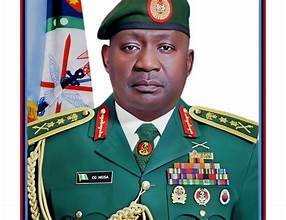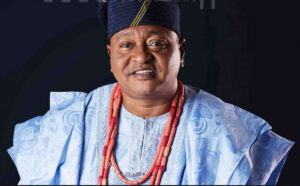I want to enjoy every moment of my career —Lade
[ad_1]
For Omolade Racheal Oyetundu, better known by her stage name Lade, rising to stardom was never going to come easy but she was prepared to test her might in a male-dominated music industry and sing her way through. From singing in the church to dominating the music industry with her hit track, Adulthood, Lade shares the story of her rise to fame, in this interview with SEGUN ADEBAYO.
How did your career in music start and what prepared you for this moment?
You know that a lot of music artistes would say their music career started in church; mine also started in church. I think the fact that my career started from the choir prepared me for this moment and other moments of my life that are yet to be unveiled. I was actually in the choir. I was in the church choir and started training myself to be a better singer, at 15. I decided to take things a top-notch higher and do music full-time.
If you started from the church, one would expect that your music will toe the gospel path. But that doesn’t seem to be the case. Did you expect your career would be this big?
Growing up, gospel music was my go-to. I also listened to some of Asa’s songs that inspired me and it was from there I started learning to write songs. You know as you grow, you begin to see different perspectives about your career and the path you really want to follow. Yes, I never knew I would be this big in a short time, but I am grateful to God for the growth and process that has helped me to become a better artiste.
So, what category of song would your music fall into?
I would describe my sound as a fusion of Afrobeats and other sounds like Soul, Highlife, R&B among others; the dream is to take Afrobeats to the world.
Starting from the church and building this fan base across the divide. How do you feel about the growth and the continuous attention that come your way?
My attraction to music came from a place of knowing that music is a gift, it wasn’t just something I went to learn from somewhere, it was in-built and I would say that God put the gift in me. I am not where I want to be as far as music is concerned but I am certainly not where I was some years back. The attention and fame and every other thing are part of the game. I want to stay humble and enjoy every bit of staying doing what I love to do best.
You have done some studio sessions with people that earned you commendation from many music lovers. Do you enjoy performing live or being in the studio?
I would say I enjoy performing live compared to studio sessions because I’m able to connect with my audience and it enables me to give them all they couldn’t get from my studio recorded songs. The feels and vibes are always different. It is not something you can compare to anything else.
How did you get into making jingles?
I got into doing jingles during the lockdown in 2020 when I did a cover of Simi’s Duduke. My boss from work at the time reached out to me and said he wanted us to work on something; he just asked me to keep coming to the studio. One day, he called me to the studio to sing and record a piece. When I was done, he told me that I should not be worried if I should hear the piece on TV or radio because it was an advert jingle for Airtel. That’s where the jingle journey began.
When you heard your jingle on air for the first time, what was the feeling like?
When I heard the finished product for the first time, I was proud of myself. I said to myself, “Lade,you are doing well.”
At that time, there was no face to the jingle. Did you feel bad that it was just your voice and not your face?
There was no face to the sound but I was still proud that something I put out was the talk of town and people were excited about it but young and old.
Did your family know it was your voice on the advert?
My family was well aware; they knew it was me because they always hear me sing even when I hadn’t gone public. Whenever I do recordings, I send it to them to get their opinions on the song, so when they heard my voice, they just kept asking to confirm if indeed I was the one.
When you started, people felt you were trying to pattern your craft after Teni. You actually sound like her but you have managed to carve your niche now. How did you handle that moment?
At first, I was excited because putting me on the same pedestal with someone like Teni is really huge. It means that people really saw something great in me and Teni is a great person. So being compared to her was awesome but at the same time, I wanted people to know me for me and recognise my voice so that whenever they heard my song, they would know it is Lade not Teni and I think I was able to do that to an extent.
How many gigs have you handled after then?
I did a lot more gigs after the Airtel advert. I’m the voice behind many jingles flying in the country at the moment and I’m proud to say that some of them include Goldberg, Travelbeta, Lacasera, Maltina, and many others.
Take us through the process you face to create your song?
My music making process starts with me laying my melodies because I know that’s where my strength lies, so I first start with laying the melodies and then I put the words into it before I write.
You rocked the music scene with your hit single, Adulthood. How much growth have you experienced after that phase?
The Adulthood anthem was inspired by hustle. The concept was drawn from a young girl trying to find her way in life; trying to make statements in an industry that is dominated by men and in order to prove that there’s so much I can do. It was a strenuous journey trying to get people to see potential in the work I was doing; things weren’t so easy and life wasn’t so fair at the time and I wish I didn’t have to grow up; that’s what was the song ‘Adulthood na scam.’
The song was a success, how long did it take you to record the song?
When I recorded the song, I didn’t know it was going to be big. It started off as a one-minute song that I wanted to use for Tik-tok content. When I presented it to my team, they just kept asking ‘where is the rest?’ They said the song was a hit and that pumped me into going back to the studio to beef up the song and I did so. After listening to the song, it dawned on me that the song is a very relatable sound because everybody was going to one thing or the other that made them relate with the song, they were just waiting for somebody to sing about it. To be honest, I never ever expected the song to go viral at all.
So you were shocked?
I was excited and shocked when the song went viral. I didn’t expect people would embrace the song because the sound was just a product of me expressing myself and all I was going through in my everyday life.
Did it translate to financial breakthrough?
I’m happy with the fact that the song spoke to millions of people. I’m happy to say a lot of opportunities came in and doors were opened after the Adulthood anthem.
What makes you happy?
Apart from my love for food, family makes me happy. When I see any of my family members doing great, I am always happy.
How would you rate the acceptance level for you now that you are a big brand?
The response I got from the industry is fantastic. I didn’t expect people in the industry to accept me with open arms. I figured that I didn’t have to do much to get them on my side and I will say the grace of God is speaking for me.
What next after Adulthood?
I’m planning to ride on the waves of the Adulthood anthem success and presently, my body of work is in the works and I want my fans to anticipate being blown away. I have plans to work with many other artistes in the near future. Currently, I have a song that is coming; I worked on this song with Crayon, it will be out soon. I wish to work with the artiste, Coffee and also I would like to work with Asa; she inspires me a lot.
READ ALSO FROM NIGERIAN TRIBUNE
[ad_2]














Post Comment